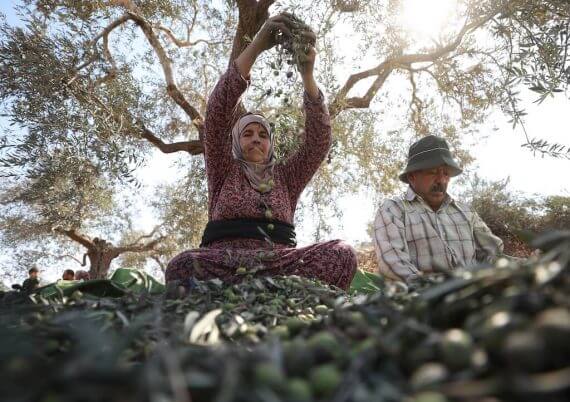GAZA, October 19, 2025 — In the olive-grove hills and fertile valleys across the occupied West Bank, this year’s harvest season has begun under the looming shadow of violence and land grabs. Between October 1 and October 9, 2025, Palestinian farmers faced a sharp escalation in attacks, expulsions, and destruction from Israeli settlers and the Israeli army—especially in the rural heartlands most exposed under the Oslo Accords’ Area C.
A Week of Systematic Attacks
Even before dawn, tension fills the winding lanes of Al-Khader, southwest of Bethlehem. This historic
farming town, split between Areas B and C and shadowed by a ring of expanding settlements like Efrat and Neve Daniel, watched as Israeli forces closed vital agricultural gates for the third consecutive year.
Farmers here, famous for their olives and grapes, now confront blocked access to their lands and the
grim prospect of ruins where groves once thrived.
In the northern Jordan Valley—a vast breadbasket under near-total Area C Israeli control—closure of
key checkpoints at Hamra and Tayasir again cut families off from fields stretching toward fading
horizons. Alongside them, the villagers of Kafr Qaddum in Qalqilya, hemmed in by settlements and the wall, stood their ground despite militias and army patrols patrolling confiscated earth.
Rural outposts such as Dhahr al-Abed, Khirbet Masoud, Zibda, and Nazlat Zaid in southwest Jenin, all
trapped in Area C, saw a new wave of harassment and expulsion as farmers tried to gather what olives
remained. Across the same region, the people of Khirbet Frasin, Kafr Rai, Nazlat al-Sharqiya, and Arraba watched settlers descend on their groves, stealing crops in broad daylight—protected, witnesses say, by heavily armed Israeli forces.
In Ya’bad, a crossroads town set among Jenin’s olive-studded hills [designated Area B for the core, but
with farmlands in Area C], the violence reached a chilling peak: settlers and soldiers assaulted and
detained an entire farming family, making off with their harvested olives.
Small hamlets like Amriha—entirely Area C, with no local protection—lost not just crops but also the
pumps and tools that make farming possible. Nearby, in Ti’nik, settlers sabotaged wells and uprooted
trees, severing a community’s lifeline.
A Landscape under siege
Further south, in Sa’ir (a hillside town split between Areas B and C, bordering the aggressive Asfar
settlement), the Shalalda family’s 14-dunum olive farm was ravaged, hundreds of trees smashed, and
sacks of olives carted away in military jeeps.
Northwest, between the villages of Rafat and Al-Zawiya (Area C territory in Salfit governorate), settlers
from newly sprung outposts battered the earth and beat local families from their land. In bustling Deir
Istiya—another township split between B and C, surrounded by Yakir, Nofim, and Immanuel
settlements—Israeli troops detained farmers or stood by as crops disappeared from the terraces.
According to local records, Salfit governorate alone—an enclave oppressed by 24 settlements and 10
pastoral outposts—has seen all main gates remain sealed for a third year. Some 4,500 dunums (over
1,100 acres) of vital farmland now lay out of reach.
Tally of destruction
* Yatta [Hebron, Area C]: More than 1,000 olive and almond trees uprooted—many owned by families
farming these hills for generations.
* Al-Mughayer and Abu Falah [Ramallah, Area C]: Nearly 40 ancient olive trees smashed, sending a
chilling signal to neighboring villages.
* Beit Ula and Halhul [Hebron, Area B/C]: Grapevine losses mounting to over a metric tonne, with fences torn down and water lines torched.
* Bruk Suleiman and Um Rukba [Bethlehem, Area C]: Military orders issued to seize dozens of dunums,
threatening both livelihoods and history.
Farms in Kafr Malik [Ramallah], Beit Sira [Ramallah], and Ras al-Qadi [Hebron, all Area C] suffer as walls, pumps, and water tanks are destroyed. Burning pipes and destroyed wells in places like Al-Jalama and Ti’nik underscore the deep vulnerability of all agriculture under direct Israeli control.
Even Palestine’s beekeepers have not been spared: the destruction of 30 hives in Turmusaya [Ramallah, Area C] means lost livelihoods and a wounded landscape.
A Call for urgent action
The Palestinian Farmers Union, tracking violations and supporting victims from Jenin to Hebron, has
sounded a desperate appeal:
“We call on the international community, humanitarian agencies, and the media to urgently intervene
and guarantee Palestinian farmers’ full and safe access to their lands—especially in Area C, where settler
violence is most acute. Without immediate protection, livelihoods will vanish, historic groves will
disappear, and the future of rural Palestine will be broken forever.
Buy your copy of thecooperator magazine from one of our country-wide vending points or an e-copy on emag.thecooperator.news
